Educators
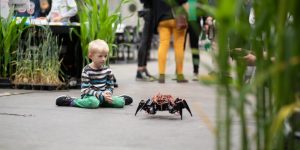
OSHub.Network
Ars Electronica (AT), Science Gallery at Trinity College Dublin (IE), Impact Hub Siracusa (IT), La Casemate (FR), Onl'Fait (CH), SCIENCE IN (CZ), Município de Figueira de Castelo Rodrigo (PO), SciCo (GR)
The pace of change in society - from technological innovation to global interconnectedness - is rapidly increasing and has fundamentally altered the way people live, work and learn. Moreover, the societal challenges of the 21st century bring with them an urgent need to integrate the knowledge and expertise of different societal actors, and to develop meaningful and inclusive ways of connecting schools, universities, enterprises, civil society, governments and local communities using more innovative, efficient and open methodologies.
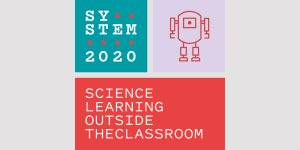
SYSTEM2020 Map
Science learning initiatives outside the classroom are crucial in educating and forming Europe’s next generation of researchers and innovators. By gaining insights into these initiatives all around Europe SySTEM 2020 wants to gain a better understanding of the types and kinds of programmes in operation, learn from each other and collaborate to be able to respond to challenges ahead. The SySTEM 2020 map is an online visualisation tool where over 2000 STEAM initiatives or projects are mapped providing a network of organisations for you to connect with. For the general public it offers a way to find informal learning initiatives in their area. For organisations it offers the opportunity to get connected and gain visibility as a collective community within Europe.
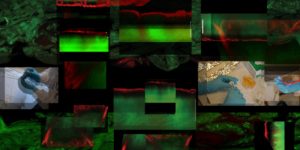
Demystifying Arts and Sciences through Playful Creative Technologies
Jo Berry (UK)
Jo Berry has implemented playful, creative methodologies to seek art's value, purpose and interpretational impact when it takes as its start point advanced imaging and microscopy. Her claim is that art can be a significant contributing factor to new directives in advanced imaging and microscopy; its impact intensified through applying play as a method to interrogate ideas, processes and outcomes. She offers a new model of research, which engages play as the critical driver to accomplish a more agile, accessible and open method of examining science via a different set of criteria. This hypothesis is based on my own prior experience as a researcher working directly with scientists and experiencing scientific method where I became convinced that artists should be central to scientific inquiry not just working on the periphery. As it would seem there needs to be a paradigm shift within science which, she claims, can be activated through examining play through art and identifying its effect on aspects of culture, creativity and aesthetics.
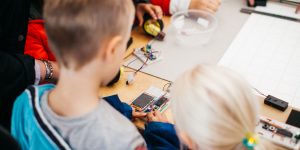
STEAM alignment across different educational levels at the University of Amsterdam
University of Amsterdam (NL)
This approach to STEAM education covers two programmes taught at the University of Amsterdam (UvA): the BSc Information Studies (three years) and the MSc Information Studies (one year) which are both located in the Computing Department. The approach provides students on both levels with room for exploration of the field based on shared activities mainly through project work. The aim is to provide students with technological, human and societal insights (theories, models, system implementations) so that they can comprehend and place themselves in the field of information science. The programmes are aimed at students from a mixture of subject backgrounds but joined in the desire to solve complex societal problems, using ICT and digital media.
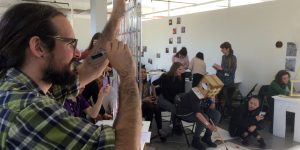
A Hybrid STEAM approach from the MA Art and Science at Central Saint Martins
University of the Arts London: Central Saint Martins (UK)
The MA Arts and Science (MAAS) is a two-year Master's programme, founded in 2011, recruiting students from different disciplinary backgrounds across the arts, sciences and humanities. The course builds a STEAM community utilising a shared studio space as a resource and setting for collaboration and cooperation. The philosophy of the course brings together different knowledges and aims to create a non-hierarchical platform for students, disciplines and methods.
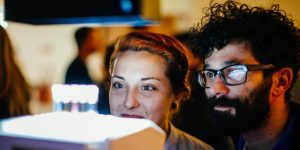
STEAM Approaches at Science Gallery at Trinity College Dublin
Science Gallery at Trinity College Dublin (IE)
Science Gallery Dublin was founded at Trinity College Dublin, the University of Dublin in 2008, with a mission to ignite creativity and discovery where science and art collide.
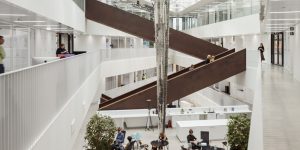
Arts for All: Aalto University-Wide Art Studies
Aalto University (FI)
The University-Wide Art Studies (UWAS) programme at Aalto University offers all students, irrespective of discipline, the chance to explore and study art and design-based practices and processes. This is a vehicle for the wider ambition of the institution to encourage the formation of transdisciplinary communities of teachers, students and researchers, with a view to tackling global challenges in imaginative and meaningful ways. There is an understanding that art and design should be considered to have a deeper purpose than the simply aesthetic: creativity can help society to be renewed.
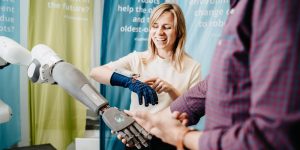
STEAM Approaches at Technische Universität Dresden
Technische Universität Dresden (DE)
The Technische Universität Dresden presents a number of approaches that employ concepts closely connected to STEAM and are transferred into/developed for teaching.
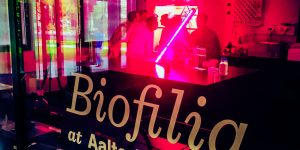
Aalto Biofilia: A journey into the biological arts
Aalto University (FI)
Biofilia is a technical facility at Aalto University for studies in the biological arts as a fast-emerging area of interest that fits succinctly with STEAM approaches in artistic practice. It adopts transdisciplinary knowledge sharing to research and curriculum development to explore the intersection between biosciences, engineering and the arts.
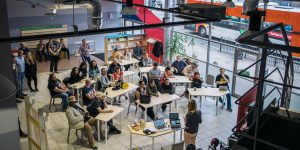
STEAM Fellows in Conversation
Steve Harding (UK)
Meet Dr Steve Harding, coordinator of BCU’s STEAM Fellows Programme, as he talks with Mark Brill (Art, Design, Media), Kusminder Chahal (Business, Law, Social Sciences) and Tychonas Michailidis (Computing, Engineering, Built Environment) about their transdisciplinary projects and how they will help to stimulate engagement across the University.
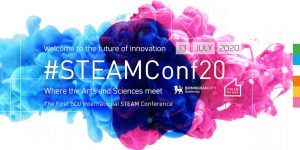
Oh My, What Now?
David Gillette (US)
Dr David Gillette from California Polytechnic State University San Luis Obispo delivers the keynote presentation for First BCU International STEAM Conference on future-focused storytelling, interactive design and sustainable futures. Dr Gillette is founder and Co-Director of the Liberal Arts and Engineering Programme at Cal Poly.

Thinking Deeper with STEAM
Rehan Bhana (UK)
Explore connections between academia and industry, learning about our PhD Hub and how STEAM thinking can help businesses tackle challenges through developing deeper perspectives, with Rehan Bhana, Associate Professor at BCU.
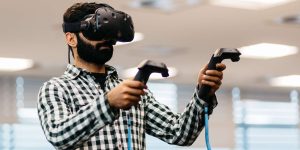
Extending Reality: Introducing the Past, Present and Future of Immersive Media
Adam Paigge (UK)
Join STEAMhouse Extended Reality Technician Adam Paigge in his talk about XR, how this can support STEAM collaboration and the ways in which STEAMhouse is leading such approaches in the West Midlands.
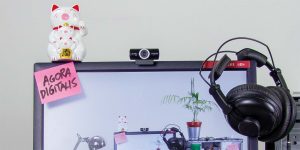
A Theory of Change
Anne Nigten (NL)
The STARTS Prize is an annual European prize for innovative projects at the interface of Science, Technology, and the ARTS. This article reflects on the most striking outcomes of a study that was conducted in the spring of 2020, to evaluate the first three STARTS Prize editions. The STARTS Prize aims to promote art as a catalyst for change and innovation in the fields of technology, science and the social sphere. It has mobilized an impressive number of artists, designers and engineers and built a strong brand in recent years.
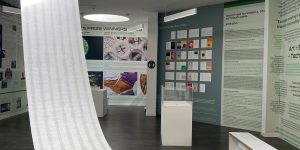
Mapping Collaborative Practice
Denise Doyle (UK), Richard Glover (UK), Martin Khechara (UK), Christian Cherene (ES), Norma Deseke (DE), Pei-Ying Lin (TW), Miranda Graaf (NL), Giulia Tomasello (IT), Tommaso Busolo (IT)
Interdisciplinary collaboration across the arts and sciences can create friction and uncertainty between creative partners from different backgrounds. How can we overcome these moments, and are they integral to any collaborative or emergent process? What role does art and science collaboration have in addressing global challenges in 2020? Chaired by Richter Glover and Martin Khechara, participants and researchers of the University of Wolverhampton’s STARTS Methodologies research project take part in this digital exchange of ideas.
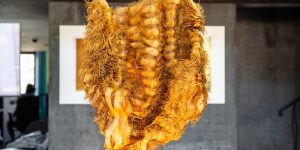
STARTS Prize Exhibition Tour
The annual STARTS Prize Exhibition presents a selection of current best practice examples at the intersection of science, technology and the arts. Kristina Maurer and Karla Spiluttini take the viewers on a journey through this year’s exhibited projects in Kepler’s Garden. From circular economy to the relationship between ecology and technology, through digital humanism and empathic approaches to artificial intelligence, the exhibition shows the outstanding diversity of artistic practice in the STARTS field.
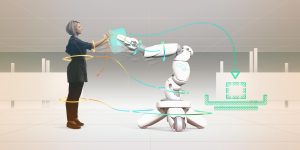
Salon Universitas
Melanie Baumgartner (AT), Florian Hartmann (AT), Christoph Guger (AT), Markus Hohenwarter (AT), Alicia Hofstätter (AT), Corinna Hörmann (AT), Martina Mara (AT), Kathrin Meyer (DE), Christopher Lindinger (AT)
This session brings together four of the exhibited teams – the LIT Robopsychology Lab, the JKU Linz School of Education, the LIT Soft Material Lab and the Institute for Integrated Circuits and their collaborative partner g.tec Medical Engineering – to discuss their creative process and prototype development.

Building Interdisciplinary Communities
Deborah Hustic (HR)
Hear from Deborah Hustic, Artistic Director at Radiona makerspace in Zagreb, Croatia, as she outlines her work in STEAM, making and creative investigation.

First BCU International STEAM Conference
STEAMhouse, Birmingham City University (UK)
Aimed at all those curious about cross-disciplinary thinking, researchers, innovators, industrial leaders, artists, scientists, technologists, engineers, mathematicians and those not bounded by their sectors, joined the First BCU International STEAM Conference in July 2020.

STARTS Prize Forum: Andrea Ling
Andrea Ling (CA)
Andrea Ling, winner of this year’s Grand Prize for Artistic Exploration, introduces her winning project “Design by Decay, Decay by Design”, a series of artifacts that exhibit designed decay developed for the 2019 Ginkgo Bioworks Creative Residency on how to design a world without waste and talks about her artistic and creative process.


